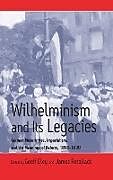Wilhelminism and Its Legacies
Einband:
Fester Einband
EAN:
9781571812230
Untertitel:
German Modernities, Imperialism, and the Meanings of Reform, 1890-1930
Genre:
Geschichte
Herausgeber:
Ingram Publishers Services
Anzahl Seiten:
280
Erscheinungsdatum:
01.05.2003
ISBN:
978-1-57181-223-0
"It is one of the main merits of this volume to historicize the 'modern' concept of parliamentarianism and democracy ... offers a stimulating contribution to the scholarship on Imperial Germany." · H-Soz-u-Kult "[this] brief review cannot do justice to the breadth of contributions offered in this slender volume. While the collection does not cover all aspects of Wilhelmine historyit does provide a good introduction to the current state o f the fieldthese essays offer avenues for further exploration rather than definitive statements." · German Studies Review "a valuable volume which makes some substantial contribution to a number of subfields in modern German historythe editors are to be thanked for assembling a volume of original and insightful works, one which ought to be in the collection of every library that supports programs in contemporary German history, cultural studies, or political science." · Canadian Journal of History/Annales canadiennes d'histoire
Autorentext
James Retallack is Professor of History at th Munk Centre for International Studies, University of Toronto. As a recipient of the Friedrich Wilhelm Bessel Research Prize from the Humboldt Foundation, in 2002-03 he was a Visiting Professor at the University of Göttingen.
Klappentext
What was distinctive-and distinctively "modern"-about German society and politics in the age of Kaiser Wilhelm II? In addressing this question, these essays assemble cutting-edge research by fourteen international scholars. Based on evidence of an explicit and self-confidently "bourgeois" formation in German public culture, the contributors suggest new ways of interpreting its reformist potential and advance alternative readings of German political history before 1914. While proposing a more measured understanding of Wilhelmine Germany's extraordinarily dynamic society, they also grapple with the ambivalent, cross-cutting nature of German "modernities" and reassess their impact on long-term developments running through the Wilhelmine age.
Zusammenfassung
What was distinctiveand distinctively "modern"about German society and politics in the age of Kaiser Wilhelm II? In addressing this question, these essays assemble cutting-edge research by fourteen international scholars. Based on evidence of an explicit and self-confidently "bourgeois" formation in German public culture, the contributors suggest new ways of interpreting its reformist potential and advance alternative readings of German political history before 1914. While proposing a more measured understanding of Wilhelmine Germany's extraordinarily dynamic society, they also grapple with the ambivalent, cross-cutting nature of German "modernities" and reassess their impact on long-term developments running through the Wilhelmine age.
Inhalt
Foreword
Volker R. Berghahn Acknowledgments Introduction
Geoff Eley and James Retallack Chapter 1. Making a Place in the Nation: Meanings of "Citizenship" in Wilhelmine Germany
Geoff Eley Chapter 2. Membership, Organization, and Wilhelmine Modernism: Constructing Economic Democracy through Cooperation
Brett Fairbairn Chapter 3. "Few better farmers in Europe"? Productivity, Change, and Modernization in East-Elbian Agriculture, 1870-1913
Oliver Grant Chapter 4. The Wilhelmine Regime and the Problem of Reform: German Debates about Modern Nation-States
Mark Hewitson Chapter 5. Lebensreform: A Middle-Class Antidote to Wilhelminism
Matthew Jefferies Chapter 6. Imperial Socialism of the Chair: Gustav Schmoller and German Weltpolitik, 1897-1905
Erik Grimmer-Solem Chapter 7. "Our natural ally": German Social Democrats, Anglo-German Relations, and the Contradictory Agendas of Wilhelmine Socialism, 1897-1900
Paul Probert Chapter 8. The "Malet Incident," October 1895: A Prelude to the Kaiser's "Krüger Telegram" in the Context of the Anglo-German Imperialist Rivalry
Willem-Alexander van't Padje Chapter 9. Colonial Agitation and the Bismarckian State: The Case of Carl Peters
Arne Perras Chapter 10. The Law and the Colonial State: Legal Codification versus Practice in a German Colony
Nils Ole Oermann Chapter 11. Max Warburg and German Politics: The Limits of Financial Power in Wilhelmine Germany
Niall Ferguson Chapter 12. Continuity and Change in Post-Wilhelmine Germany: From the 1918 Revolution to the Ruhr Crisis
Conan Fischer Chapter 13. A Wilhelmine Legacy? Coudenhove-Kalergi's "Paneuropa" as an Alternative Path towards a European (Post-)Modernity, 1922-1932
Katiana Orluc Chapter 14. Ideas into Politics: Meanings of "Stasis" in Wilhelmine Germany
James Retallack
Notes on Contributors
List of Publications by Hartmut Pogge von Strandmann

Leider konnten wir für diesen Artikel keine Preise ermitteln ...
billigbuch.ch sucht jetzt für Sie die besten Angebote ...
Die aktuellen Verkaufspreise von 6 Onlineshops werden in Realtime abgefragt.
Sie können das gewünschte Produkt anschliessend direkt beim Anbieter Ihrer Wahl bestellen.
Loading...
Die aktuellen Verkaufspreise von 6 Onlineshops werden in Realtime abgefragt.
Sie können das gewünschte Produkt anschliessend direkt beim Anbieter Ihrer Wahl bestellen.
| # | Onlineshop | Preis CHF | Versand CHF | Total CHF | ||
|---|---|---|---|---|---|---|
| 1 | Seller | 0.00 | 0.00 | 0.00 |
